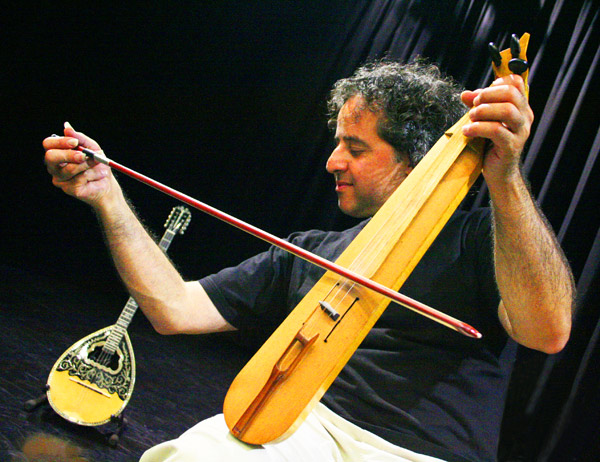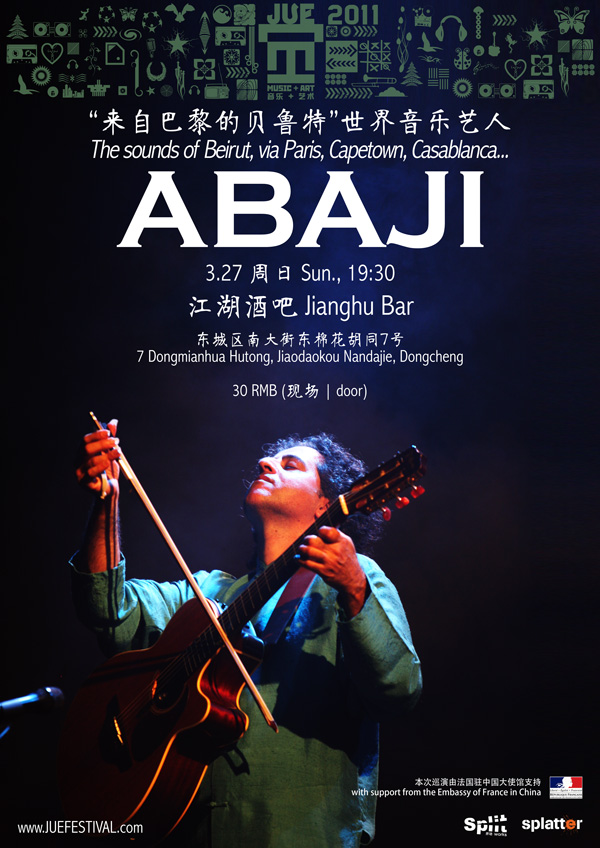[:en]
Jue | Music + Art 2011 presents
World music musician Abaji Beijing show
The sounds of Beirut, via Paris, Capetown, Casablanca…This man owns over 250 instruments. No joke.
Event photos (by beijingdazed.com ; Click to enlarge)
[flickr album=72157626405452711 num=5 size=Thumbnail]
Mar 27, Sun
@ Jianghu Bar
Door TIme: 19:30
Address: No.7 Dongmianhua Hutong, Jiaodaokou Nandajie, Dongcheng District
Support Act: TBD
30 RMB(door)
Tel: 010-64014611
Check out www.juefestival.com for more ticket info
=============================================
The Paris-based multi-instrumentalist and singer Abaji was born in Lebanon to an Armenian-Greek father and Armenian-Syrian mother, both of whom were born in Turkey.
Coming from a musical family, Abaji took up the guitar at age 11, followed by other instruments: clarinet, drums, oud, bouzouki and flutes acquired on his travels around the world. He put these varied instruments to use in unconventional ways, developing a sound that fused his musical passions: Indian music, Oriental music, and blues. Today, he is something of a musical hoarder, estimating that he owns over 250 musical instruments.
In 1976, Abaji arrived in France just after the Lebanese Civil War began. He showed a passion for traditional Chinese medicine. At the Medical University in Paris, Abaji pursued his interest in traditional Chinese medicine. He subsequently became a therapist, practising Tai Chi in psychiatric hospitals for seven years.
But Abaji continued to pursue his love of music, releasing his first album, “Paris-Beyrouth” in 1996. The album included songs sung in French, Arabic and English.
The song “Gibran” from his 2000 album “Bedouin Blues” was discovered by the German world music label Network Medien, beginning Abaji’s collaboration with the label for the next five years, during which he released the albums “Oriental Voyage” (2003) and “Nomad Spirit” (2005), which featured Armenian duduk player Djivan Gasparyan, Indian percussionist Ramesh Shotham and Moroccan musician Majid Bekkas.
Abaji has travelled searching for new musical inspirations to visit with the Zulus of South Africa, the Gnawas of Morocco and the Kawwali of Pakistan.
In 2009, Abaji performed in his native Lebanon for the first time, after 33 years of exile. That same year, he released his latest album, “Origine Orients,” which features singing in the five languages of his family: French, Arabic, Greek, Turkish and Armenian.
2011《觉》音乐+艺术节呈现
“来自巴黎的Beirut”世界音乐艺人Abaji北京专场

3月27日 周日
@ 江湖酒吧
入场:19:30
地址:东城区南大街东棉花胡同7号(南罗鼓巷)
嘉宾:张玮玮、宋雨喆、朱家明
票价:30元(现场)
电话:010-64014611
详情查询《觉》官网:www.juefestival.com
============================================================================
2009年对于Abaji来说是特别的一年:在背井离乡33年后他带着自己的第一场黎巴嫩演唱会重新回到故土,这个他出生的地方。他发行了第五张专辑《Origine Orients》,这是一张回归东方本源的专辑,同时他还和黎巴嫩东方舞蹈家Nawal Raad,一位结合地中海民族韵味与现代风格的艺术家,合作筹划新演出。
Abaji出生于黎巴嫩,父亲具有亚美尼亚和希腊血统,出生于土耳其的士麦那;母亲则具有亚美尼亚和叙利亚血统,出生于土耳其的伊斯坦布尔。他们相见于黎巴嫩,这个充满着流放者的地方。
Abaji1976年在战争刚打响时来到了法国。他对中国的传统中医学显示出了极大的热情:太极拳和Do In。他在法国医科大学学习并成为了一名治疗家,在一家精神科医院研究实践太极疗法长达七年。同时,研习音乐在他的家庭中也是一项传统,因此Abaji在11岁时便开始学习吉他,之后又相继学了单簧管,打击乐和乌得琴,布祖基琴,以及他游历世界各地收集来的长笛。在这之后,他把自己丰富的器乐知识和音乐热情综合起来,创造了具有印第安风情的音乐,东方民乐和蓝调。在音乐创作上他永远寻找着新鲜的想法,他曾经在各个国际艺术节的舞台上用一把小提琴弓来演奏吉他。
他与Gabriel Yared的接触起到了关键的作用;后者是著名的电影音乐作曲家,在听到他的第一张专辑时便鼓励他的音乐之路。
1996年,Abaji制作了他的首张专辑“Paris-Beyrouth”,用法语,阿拉伯语和英语进行演唱。之后,在他歌曲“Gibran”中的“Bedouin Blues”被德国音乐厂牌Network Medien发现。这首歌曲是“Desert Blues 2”中的重要发现之一。从这时开始他与该厂牌进行长达五年的合作,制作了下一张专辑“Oriental Voyage”,因其精良的录音制作被赋予“Classica”的赞誉。接下来的专辑“Nomad Spirit”,众多优秀音乐家被邀请参与创作:包括亚美尼亚传统乐器杏木双簧管演奏家Djivan Gasparyan,印第安打击乐家Ramesh Shotham,摩洛哥音乐家Majid Bekkas。专辑中的两首歌被收录进“Diaspora of Rembetiko”和“Emociones” Network Medien 25年最佳歌曲选集中。
Abaji同时也是法国厂牌Kosinus下电影和电视的音乐作曲者。他为法国二台当年Jean-Charles Deniaud的纪录片 “Le Temps des Otages”创作了音乐,2009年4月在电视台播出。
音乐的机缘使Abaji与世界五大陆都建立了联系:与南非的祖鲁人,与墨西哥的印第安人,与摩洛哥的gnawas,与巴基斯坦的Kawwali。大家一同分享音乐的美好!
2009年是特别的一年,因为这个黎巴嫩出生法国长大的音乐天才;多种器乐演奏家和歌者决定自己制作第五张专辑,专辑将只录制一次并且使用家庭中的五种语言进行演唱:法语,阿拉伯语,希腊语,土耳其语和亚美尼亚语。

[:]